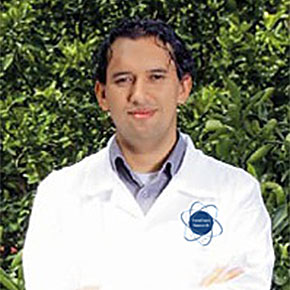Independent Researcher with a Love of Problem Solving
Interview with IdeaConnection problem solver Hugo Hernandez. By Paul Arnold
Colombia-based IdeaConnection problem solver Hugo Hernandez is an independent researcher and consultant focused on understanding the basic principles underlying chemical processes. At his own website http://www.forschem.org, he publishes open access research reports in chemistry and chemical engineering.
In this interview, Hugo talks about his work on IdeaConnection challenges and his motivation as a scientist working and publishing independently.
 I was working in research and development in a chemical company for more than 15 years, but I reasoned that when I was conducting research for a project there was more administration work than actual technical work. I felt I was not doing the research I wanted to do. I wanted to research on my terms.
I was working in research and development in a chemical company for more than 15 years, but I reasoned that when I was conducting research for a project there was more administration work than actual technical work. I felt I was not doing the research I wanted to do. I wanted to research on my terms. So, I was able to make a decision to sort out my financial duties and responsibilities and I become independent. My true work is doing my own independent research. I don’t get any external funds so it’s all down to me. I really believe in science but I think that unfortunately, science has become very commercial in many ways. For example, scientific publishing and scientific conferences became profitable businesses. I am not saying that this is bad, just that it is dangerous, and it should not be the purpose of science. Thus, I decided to become independent and give my research results to the world for free.
You made this big change a few years ago, are you still sure it was the right decision?
Definitely. I’m sorry not to have made it before. I am very happy like this, researching and helping science. And then as a hobby, I work on challenges. They are great for me to do because I like to work on technical problems. Also, I like to learn which you do with interesting challenges.
What else do you enjoy about working on team challenges with IdeaConnection?
It is very interesting to work with people who have different talents and who think differently from you. It’s great to discuss ideas with other people around the world and figure out a solution. However, sometimes it’s not so easy. I usually feel more comfortable working alone because I can work at my own pace and my own rhythm. Working on teams has its pros and its cons and sometimes you have constraints because of the length of the meetings plus you are reliant on other people doing their tasks.
With the first challenge I worked on there was a very nice team with a good chemistry but at the end, the solution was not awarded. With the second team, it didn’t quite work at first as a couple of solvers left but those of us who remained behind worked harder. There were opposing views but ultimately, we moved in the same direction and delivered very nice solutions.
And typically these sorts of debates and discussions are useful?
I think it depends on the team and the different personalities. In most cases these technical debates are very interesting and active but, in some others, you can get the feeling they are just dragging on wasting effort and energy. However, in the end, you always learn something new.
Another thing to point out is that some people are more aggressive with respect to their ideas. I'm not going to impose an idea. If people think my ideas are good, that’s great. But if they don’t like them I don’t have a problem with that. And of course, a lot depends on the facilitator and how they manage the teams.
How do you find the experience of being a remote solver and not being in the same physical space as your colleagues?
For me, it was not an issue. I was already used to having meetings by phone and Skype. However, it’s a little different because sometimes you don’t get to interact directly. But for me, it works fine. We live in a much-globalized world and I think this way of working and collaborating is becoming more natural.
You were part of the successful problem-solving team that worked on the Markush challenge. Now did you have an idea of what the solution might be before you knuckled down to work on it?
I did not have any idea at first. The challenge was related to chemistry but there was also a programming element. I am an expert in chemistry but didn’t have an idea of how the software part of the solution would work. But I did know the requirements of the solution seeker and so I put myself in their shoes. I tried to ask questions as if I was the seeker. People with IT knowledge had many ideas and came out with a lot of options. We worked together well.
And finally, please describe what it was like when you were awarded the prize.
When I received the email, I started to read it and thought OK this has been rejected. I didn’t have high expectations, and even though we worked hard on a good solution, we finished just in the nick of time. Then I re-read it and saw that we had actually been successful. So that was a very good moment.
